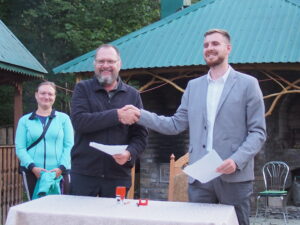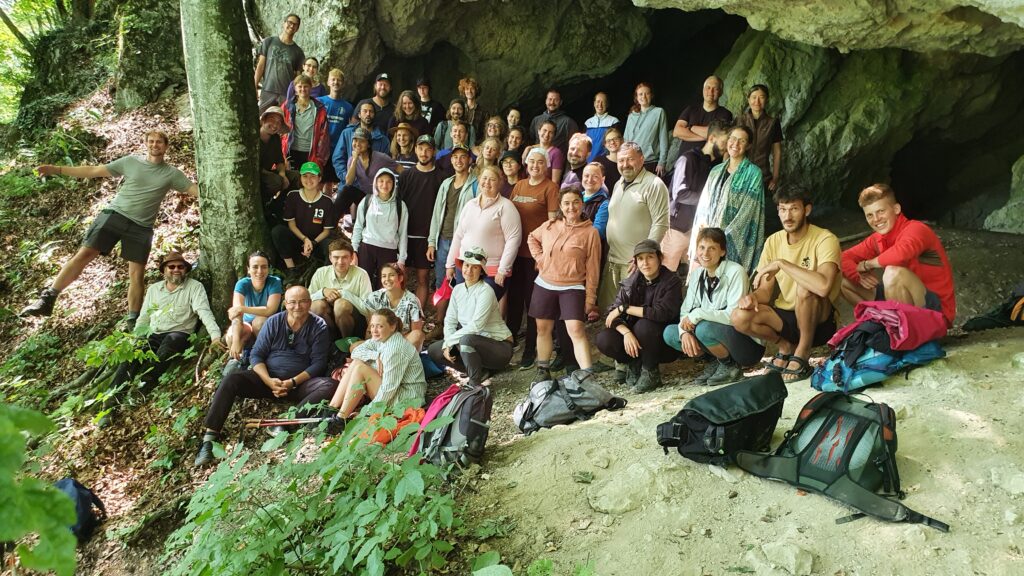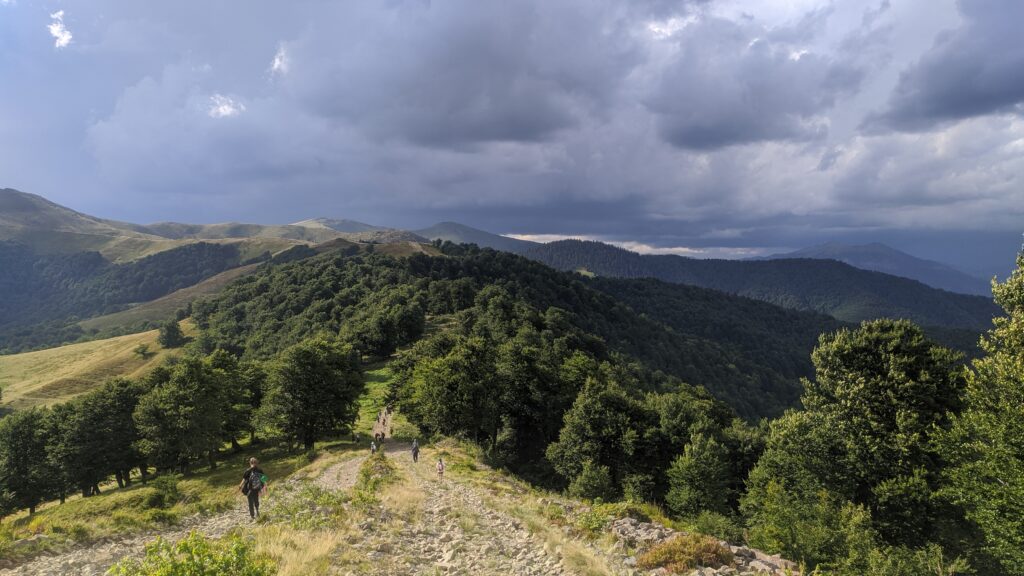Allgemeines
Diese Datenschutzerklärung soll die Nutzer*innen dieser Website gemäß EU-Datenschutzgrundverordnung (DSGVO) über die Art, den Umfang und den Zweck der Erhebung und Verwendung personenbezogener Daten durch die Hochschule für nachhaltige Entwicklung Eberswalde, als Betreiber dieser Website, informieren.
Wir nehmen Ihren Datenschutz sehr ernst und behandeln Ihre personenbezogenen Daten vertraulich und entsprechend den gesetzlichen Vorschriften.
Zugriffsdaten
Wir erheben Daten über Zugriffe auf die Seiten und speichern diese als Server-Logfiles ab. Folgende Daten werden protokolliert:
- Besuchte Website
- Uhrzeit zum Zeitpunkt des Zugriffes
- Menge der gesendeten Daten in Byte
- Quelle/Verweis, von welchem Sie auf die Seite gelangten
- Verwendeter Browser
- Verwendetes Betriebssystem
- Verwendete IP-Adresse
Die erhobenen Daten dienen der Bedrohungsanalyse sowie statistischen Auswertungen und um die Funktionsfähigkeit der Website sicherzustellen. Zudem dienen uns die Daten zur Optimierung der Website und zur Sicherstellung der Sicherheit unserer informationstechnischen Systeme. Wir behalten uns allerdings vor, die Server-Logfiles nachträglich zu überprüfen, sollten konkrete Anhaltspunkte auf eine rechtswidrige Nutzung hinweisen.
Cookies
Wir setzen Cookies ein, um unsere Website nutzerfreundlicher zu gestalten. Einige Elemente unserer Internetseiten erfordern es, dass der aufrufende Browser und damit auch Nutzer auch nach einem Seitenwechsel identifiziert werden kann. In den Cookies werden dabei Log-In-Informationen gespeichert und übermittelt. Unsere Website kann auch ohne Cookies benutzt werden. Dazu müssen Sie Cookies in Ihren Browsereinstellungen deaktivieren.
Sicherheitsmaßnahmen
Wir treffen technische, und organisatorische Sicherheitsmaßnahmen entsprechend dem Stand der Technik, um sicher zu stellen, dass die Vorschriften der Datenschutzgrundverordnung und der Datenschutzgesetze eingehalten werden und damit die durch uns erhobenen, verarbeiteten Daten gegen zufällige oder vorsätzliche Manipulation, Verlust, Zerstörung oder gegen den Zugriff unberechtigter Dritter geschützt sind.
Umgang mit personenbezogenen Daten
Als personenbezogene Daten gelten sämtliche Informationen, welche dazu dienen, Ihre Person zu bestimmen, oder mit denen Ihre Person bestimmt werden kann.
Wir erheben und nutzen Ihre personenbezogenen Daten nur, soweit dies zur Bereitstellung einer funktionsfähigen Website sowie unserer Inhalte und Leistungen erforderlich ist und wenn dies im gesetzlichen Rahmen erlaubt ist oder Sie in die Datenerhebung einwilligen. Eine Weiterleitung von Daten findet nur statt, soweit hierzu eine gesetzliche Verpflichtung besteht, an die laut Gesetz zuständigen Empfänger.
Nehmen Sie mit uns durch die angebotenen Kontaktmöglichkeiten Verbindung auf, werden Ihre Angaben gespeichert, damit auf diese zur Bearbeitung und Beantwortung Ihrer Anfrage zurückgegriffen werden kann. Ohne Ihre Einwilligung werden diese Daten nicht an Dritte weitergegeben.
Umgang mit Kommentaren und Beiträgen
Hinterlassen Sie auf dieser Website einen Beitrag oder Kommentar, kann der Ursprung der Eintragung mit Hilfe der Logfiles (siehe Abschnitt Zugriffsdaten) zurückverfolgt werden.
Google Analytics
Diese Website nutzt den Dienst „Google Analytics“, welcher von der Google Inc. angeboten wird, zur Analyse der Websitebenutzung durch Nutzer. Der Dienst verwendet „Cookies“ — Textdateien, welche auf Ihrem Endgerät gespeichert werden. Die durch die Cookies gesammelten Informationen werden im Regelfall an einen Google-Server in den USA gesandt und dort gespeichert.
Wir erstellen mithilfe der von Google Inc. gesammelten Informationen eine Auswertung der Websitenutzung und der Websiteaktivität. Diese Auswertung dient einzig und allein dem Zweck, die Website derart zu verbessern, dass Informationen besser gefunden werden können bzw. Informationen und Kampagnen gezielt platziert werden können.
Sie haben die Möglichkeit, die Speicherung des Cookies auf Ihrem Gerät zu verhindern, indem Sie in Ihrem Browser entsprechende Einstellungen vornehmen. Es ist nicht gewährleistet, dass Sie auf alle Funktionen dieser Website ohne Einschränkungen zugreifen können, wenn Ihr Browser keine Cookies zulässt.
Hier finden Sie weitere Informationen zur Datennutzung durch die Google Inc.: https://support.google.com/analytics/answer/6004245?hl=de
Rechte der Nutzer*innen: Auskunft, Berichtigung und Löschung
Nutzerinnen und Nutzer haben das Recht auf Antrag unentgeltlich Auskunft über die personenbezogenen Daten zu erhalten, die von uns über sie gespeichert werden.
Zusätzlich haben die Nutzer das Recht auf Berichtigung unrichtiger Daten, auf Einschränkung der Verarbeitung und Löschung ihrer personenbezogenen Daten, sowie auf Datenportabilität und im Fall der Annahme einer unrechtmäßigen Datenverarbeitung, eine Beschwerde bei der zuständigen Aufsichtsbehörde einzureichen.
Ebenso können Nutzer*innen Einwilligungen, grundsätzlich mit Auswirkung auf die Zukunft, widerrufen.
Die bei uns gespeicherten Daten werden gelöscht, sobald sie für die genannte Zweckbestimmung nicht mehr erforderlich sind und keine gesetzlichen Aufbewahrungsfristen entgegenstehen.
Bei allen Fragen zur Erhebung, Nutzung oder Verarbeitung Ihrer personenbezogenen Daten, bei Auskünften, Berichtigung, Sperrung oder Löschung von Daten sowie Widerruf erteilter Einwilligungen wenden Sie sich bitte an die/den Datenschutzbeauftragte/n.
Anschrift deR/deS Datenschutzbeauftragte/n
biosphere.center
c/o Hochschule für nachhaltige Entwicklung Eberswalde
Schicklerstraße 5
16225 Eberswalde
Anschrift Der/des Verantwortlichen
biosphere.center
c/o Hochschule für nachhaltige Entwicklung Eberswalde
Schicklerstraße 5
16225 Eberswalde
info@biosphere.center
+49-3334-657-364



